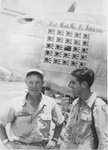airminded88
Airman 1st Class
Curious things happens in those days indeed.
I've read about a Bf-109 (maybe inexperienced pilot) forming up on a flight of P-51s and, upon realizing he was among the wrong pack, thundered down in a powered dive getting away as quickly as possible.
I've read about a Bf-109 (maybe inexperienced pilot) forming up on a flight of P-51s and, upon realizing he was among the wrong pack, thundered down in a powered dive getting away as quickly as possible.

